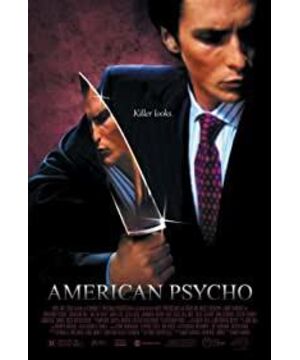After reading a lot of film reviews, I think it was killed.
Assuming that there is no murder, then this movie is really boring, and it even makes me not have the desire to produce it carefully. It is just like a garbage domestic ghost movie. It's all a dream~ (I really want to vomit...)
The controversy happened to be that if it was a murderer, there are many unexplainable things in the film, such as the suddenly changed murder apartment, Bateman's shooting method that can blow up a police car with a single headshot, and the text that appears on the ATM is making The audience thinks he is really mentally ill, which is all imaginary.
Everyone can feel that what the movie wants to express is the morbid state of American society.
The recurring confessors, the texture and design of the business cards, and the pursuit of more dental cleaning in high-end restaurants, all show that everyone in the society does not care about people. Therefore, he could walk out of the building with a grandiose bag, without even looking at the doorman, when he slid into the taxi, a person he knew appeared, but he asked: "Where did you buy your travel bag?" This is already quite obvious to express the meaning of nobody care. Including the part of killing people by throwing chainsaw in the corridor, there was such a big movement in the middle of the night that no one was there. I think this was also intentional. The first function is to make the audience think that this is a fantasy. There is no other person in Bateman's fantasy, and the other is true. Even if other residents woke up in the middle of the night and heard a woman calling for help outside, they were deemed to have not heard.
The ATM machine started a series of out-of-control. This paragraph is ironclad evidence of psychosis, because it is unreasonable. However, except for the words on the AMT machine, I think all of them are in line with the previous foreshadowing. The magical marksmanship and the explosion of police cars are not unreasonable. Maybe (he looked at the hand holding the gun incredibly), the security guard who shot his head shot mistaken him, and went to the company with sweat and panic signing his signature, but the janitor was just looking at his own newspaper.
The corpse apartment was changed. He went directly to open the door of the room where the corpse was hidden, and the old woman asked him suggestively: "Did you read the New York Times?" including saying: "I suggest you leave and don't come back." Obviously, the old woman was absolutely aware, and it also proved that Bateman was not mentally ill. If it was mentally ill, there would not be such a meaningful conversation. The reasonable inference is that this is Paul’s family and found that Paul’s house contains a lot of dead bodies. In addition, Paul was missing, so he helped him deal with the body.
In the lawyer paragraph, the lawyer thought that Bateman was joking, and seriously said that he met Paul in LONDON and was defending him, because Bateman said on the phone: Keep your eyes open (leave a little note), which may make the lawyer think that the employer wants to let him He thinks of a solution. Yes, when the lawyer heard the employer say that he was a murderous madman, he didn't care at all, and he even took cover for him.
The most important thing should be Bateman's confession and confession. After experiencing all this, he feels that his guilt has not been released, and his confession and confession have not been freed, because he is inexplicably free from sin and has an invisible giant hand. Helped him to wipe out his sins, it was American psycho, a sick society.
Assuming that everything is fake and all fantasy, the self-anatomy in the last few minutes becomes empty talk, which will turn this movie into a rotten one. It will end up as a mental patient movie like the island of death and lethal ID. Didn't make it clear that he is a mental patient or medical history?
Assuming everything is true, then the final confession can be considered a climax and thought-provoking.
It's a pity that there are doubts about both false and true. Perhaps the producer just wants to make such an ambiguous look so that the audience can choose. But I think this kind of open ending actually reduces the movie's points, because I think everything is real, it looks terrible, and it shows that the American mental patient is the United States.
I prefer to treat the unreasonable parts as exaggeration and confusing the audience, such as the characters on the ATM, the blasting method and so on. These parts make everyone appear to make choices. Is this true? The choice you make is equivalent to what movie you watched.
The choice is true, that is a heavy crime movie with a lot of black humor, Bateman cannot redeem himself
The choice is false, that is, a garbage open-ended mental patient movie with no clear explanation, such as Fight Club, Confinement Island, and Fatal ID will explain to the audience to feel at ease. Yes, he is mentally ill.
View more about American Psycho reviews











